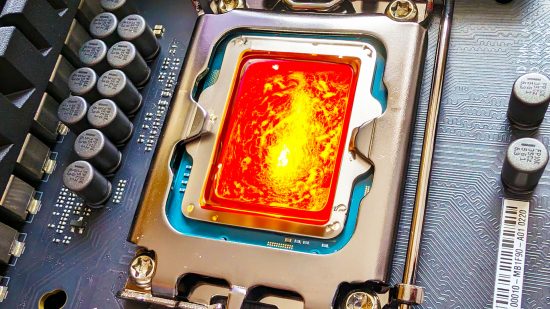Intel has blamed motherboard manufacturers for the spate of recent complaints about game crashes on Intel CPUs, saying that motherboards are running the company’s processors beyond their recommended power settings. It’s not just that the motherboards have the ability to run the CPUs at these settings, but that they do it by default. If you own a Core i9 system based on a Z690 or Z790 motherboard, there’s a high likelihood that your CPU is running beyond its recommended specifications.
Intel has struggled to keep up with AMD when it comes to making the best gaming CPUs recently, and while the Core i9 14900K is still a fast CPU, in our tests we found that it generated a large amount of heat, and consumed a lot of power, in the process. Intel’s statement follows several weeks of reports about Intel CPU instability in Unreal Engine games, with players reporting crashes during shader compilation, and error messages saying they don’t have enough video RAM.
In an official statement given to Igor’s Lab, Intel confesses that “the root cause has not yet been identified,” but says it’s observed that “the majority of reports of this issue are from users with unlocked/overclock capable motherboards.”
The key problem, says Intel, is that CPUs are being run in “out of specification operating conditions,” which it says result in “sustained high voltage and frequency during periods of elevated heat.” Specifically, Intel says it’s observed that motherboards based on its 600/700-series chipsets “often set BIOS defaults to disable thermal and power delivery safeguards designed to limit processor exposure to sustained periods of high voltage and frequency.”
As a result, Intel says it’s requesting motherboard manufacturers to change their default BIOS settings to match Intel’s recommended settings. The CPU maker also says it “strongly recommends motherboard manufacturers to implement warnings for end users alerting them to any unlocked or overclocking feature usage.”
Intel gives the following examples of BIOS settings it’s observed that make a CPU run outside of its recommended specifications:
- Disabling Current Excursion Protection (CEP)
- Enabling the IccMax Unlimited bit
- Disabling Thermal Velocity Boost (TVB) and/or Enhanced Thermal Velocity Boost (eTVB)
- Disabling C-states
- Using Windows Ultimate Performance mode
- Increasing PL1 and PL2 beyond Intel recommended limits
Intel says it’s going to carry on investigating these issues to “determine the root cause,” with a view to publishing a public statement about recommended BIOS settings for its CPUs in May 2024.
On the face of it, this statement paints a picture of Intel being the innocent party, with motherboard manufacturers deliberately running their CPUs beyond their specifications, but it also raises questions. Yes, the CPUs are being run outside of official specifications, but these default BIOS settings are hardly new, and they were also the defaults when Intel was sending 14th-gen test kit out to reviewers. Is Intel saying it didn’t know?
In the meantime, both Asus and Gigabyte have launched new BIOS updates for a lot of their Z790 motherboards to run them at “Intel Baseline” settings, while MSI has issued a guide on which BIOS settings to change. For more information, see our guide on how to stop game crashes on Intel CPUs, and also read our guide on how to flash your BIOS if you’ve never done it before.
